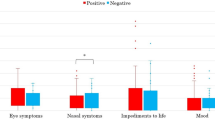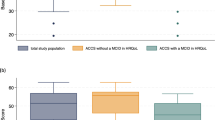Abstract
Introduction:
Previous postal administration of Mini Asthma-related Quality of Life Questionnaire (Mini-AQLQ) (validated for self-completion under supervision) resulted in 12.7% completion error rate.
Aims:
To administer the Mini-AQLQ by post with instructions, and to compare completion errors with our previous study and usable response rate with supervised self-completion.
Method:
The Mini-AQLQ, with an instruction sheet, was posted to 96 participants from UK general practice, for completion 1 week before supervised self-completion in the surgery.
Results:
94/96 (98%) postal questionnaires were returned: the error rate of 10.6% was similar to our previous study (postal versus previous: 10/94 versus 23/181: P = 0.62). 86/96 (90%) attended for supervised completion with no completion errors (supervised versus postal: 0/86 versus 10/94: P ≤ 0.01) Overall usable response rates were similar. (supervised versus postal: 86/96 versus 84/96, P = 0.65).
Conclusion:
Our instruction sheet did not significantly reduce postal completion errors, however the good postal return rate achieved comparable overall usable response rates to supervised administration.
Similar content being viewed by others
Article PDF
Author information
Authors and Affiliations
Corresponding author
Rights and permissions
About this article
Cite this article
Pinnock, H., Sheikh, A. & Juniper, E. Evaluation of an intervention to improve successful completion of the Mini-AQLQ: comparison of postal and supervised completion. Prim Care Respir J 13, 36–41 (2004). https://doi.org/10.1016/j.pcrj.2003.11.004
Issue date:
DOI: https://doi.org/10.1016/j.pcrj.2003.11.004



